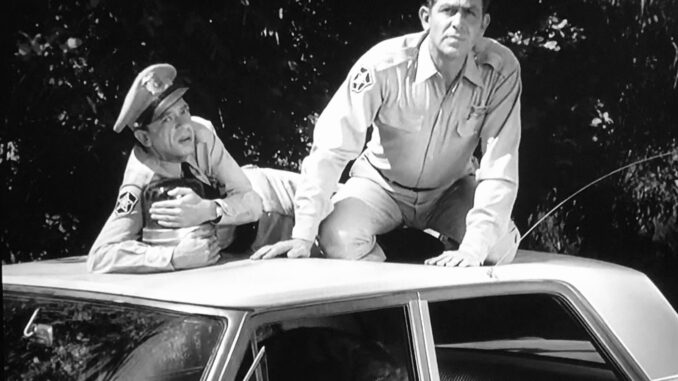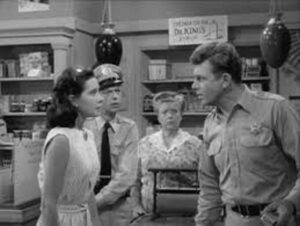
Before Betty Lynn became Thelma Lou, she was a proud patriot who entertained our troops.
The actress, who was best known for playing Barney Fife’s sweetheart on “The Andy Griffith Show,” passed away in October 2021 at age 95. She had been working on an autobiography before her death, which was released posthumously on Monday. The book, titled “Becoming Thelma Lou – My Journey to Hollywood, Mayberry, and Beyond,” was co-authored by pals Jim Clark and Tim McAbee.
McAbee told Fox News Digital that one of Lynn’s proudest achievements from her decades-long career was that of a performer as part of the USO Camp Shows. She started in 1944 and took her talents overseas, performing in the USO for service members during World War II. She was “thought to be the only American woman to have traveled the dangerous Burma Road during the war,” according to a statement from The Andy Griffith Museum in Mount Airy, North Carolina.
“I was in awe of hearing her stories,” said McAbee. “This was a young lady straight out of high school who put herself in very difficult situations. She chose to travel and perform for soldiers and visit them in hospitals. All she wanted to do was try and cheer them up. It didn’t matter if she found herself in harsh terrains or if temperatures were over 100 degrees. She was a very proud [patriot] and wanted to serve in any way she could. And she was just as proud of that as anything else she did in Hollywood, if not more.”
In her memoir, Lynn recalled how at age 18 she reached out to perform for the USO Camp Shows but needed her mother’s permission to join. While the matriarch was wary of her young daughter heading overseas, Lynn reminded her that “if I were a boy, they would make me go.”

“I was very patriotic, as most people in those days were, and I wanted to do something for the war effort,” Lynn wrote. “I convinced Mother that this was what I wanted to do. Even though Mother was very scared for me… she signed the papers allowing me to join the USO.”
Lynn’s conditions were far from glamorous. Lynn recalled how in Casablanca, Morocco, she “shared a dingy room” with a violin player where she slept on “a tattered mattress on the floor” that was “stuffed with straw and smelled of urine.” Still, Lynn said she was determined to meet the soldiers who were defending her country. She went on to make stops in Cairo, Tehran and Karachi, among others.
At one point, she traveled on bridges made of bamboo and rope following a “monsoon-like downpour.” She even described how a Marine captain gave her “a blue steel .32 automatic pistol and a shoulder holster” — just in case. Meals consisted of bread, which often became infested with insects, as well as oranges, bananas and coffee.
“At this point in our touring, we were not just visiting hospitals,” Lynn explained. “Wherever there were even a couple of servicemen, we would be sent to visit. In part, because everything was so unpredictable from day to day, our itinerary was not very organized. It was a matter of performing wherever we were needed or wherever we happened to be at that time.”
“I swam in the Salween River,” she later shared. “Actually, I didn’t exactly swim in it per se, because I can’t swim, but I bathed in the river while wearing my clothes. If I had to go to the bathroom, somebody would have to check out the latrine, and then let me in and stand guard to ensure my privacy. To give me a shower, the men poured buckets of water over me, but I was dressed.”
McAbee said it was important for Lynn to remember the soldiers she befriended during her travels in Asia.
“She explained to me that she was always patriotic,” he said. “She loved her country. She wanted to do her part. And she chose to go. Even towards the end of her life, she would become emotional just talking about those hospital visits. She would describe how she would meet one soldier at a hospital, but the next day, when she returned, that soldier was no longer there. He had passed. It always made her incredibly sad.”
